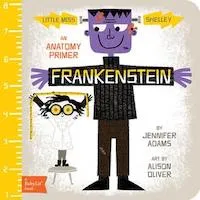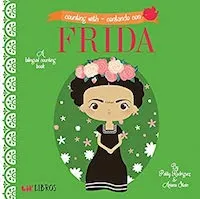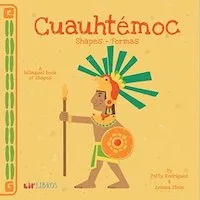
Why I’m Obsessed with BabyLit
As a relatively new bibliophile parent, I’m eager to pass my love of books to my infant daughter. We read to her constantly, pointing out pictures to her, and trying to get her to interact. It brings me great joy to see her looking at books when she’s playing by herself. As I’ve come across a lot of board books these past 20+ months of new parenthood, I’ve found myself obsessed with the BabyLit series, which includes board books about Frankenstein, Sherlock Holmes, and Dracula.
Brief Introduction to BabyLit
Utah publisher Gibbs Smith began publishing these books in 2011/2012 based on classic literature. The idea came from Suzanne Taylor, now Chief Creative Officer, and came to life thanks to staffers Jennifer Adams and Alison Oliver. Taylor said to Publishers Weekly: “More than a decade ago, I noticed that there was a resurgence of interest in classic literature — and an interest in finding new ways to explore it and respond to it,” she recalled. “And the idea of redefining the notion of classics to share them with babies occurred to me — it was really a lightning-strike moment!”
They started with a few classics — Alice in Wonderland, Jane Eyre, Pride and Prejudice, and Romeo and Juliet — and Publishers Weekly reported that in their 10th anniversary year in 2021, they have 95 titles and have sold over 2 million copies in North America. I think a good fourth of that is in my home right now.
In addition to the classic literature, they also have biographical books about naturalists and poets, books about places, distribute Spanish-language books from Lil Libros and more.
Ariana Stein and Patty Rodriguez founded Lil Libros because they wanted to “introduce bilingualism and Latin American culture through picture board books.”
Clever Adaptations of Classic Works

Frankenstein: A BabyLit Anatomy Primer by Jennifer Adams and Art by Alison Oliver
I’ve always been fond of baby books that tackle adult topics. I used to give a baby book about calculus to my friends when they started having babies. Part of it was tongue in cheek; part of it was the belief that if you introduced concepts like complex mathematics at an early age, there would be less fear about the topic later in life.
So when I started finding BabyLit Classic books, I was naturally intrigued. But what really sold me on the franchise was Frankenstein, the simple text by Jennifer Adams, and Art by Alison Oliver. Instead of the book trying to summarize the plot of Frankenstein in a few pages, it has a tongue in cheek component. It’s a book to teach children about parts of the body using Frankenstein’s Monster. Sir Arthur Conan Doyle’s Sherlock Holmes: Hounds of the Baskervilles teaches different sounds of doors creaking, lightning crashing, and more.
Adams explained the idea to PW: “[I]t’s important to note that these books are not retellings. A retelling of Anna Karenina for a 3-year-old would be ridiculous! [In a shrewd paring-down, BabyLit’s tie-in to Tolstoy’s 1877 masterpiece is Anna Karenina: A Fashion Primer.] The series features primers that teach age-appropriate concepts for babies, but use the characters, settings, and storylines of classic novels to do so. When the books are working at their best, they are functioning on two levels — for the child and also for the adult.”
I think finding baby books of any sort that work on both levels is important. My child learns important words and is exposed to classic literature at a very basic level…and I get to enjoy reading the story. I love seeing how the authors have reimagined each classic book. Some introduce various characters from Shakespeare’s A Midsummer Night’s Dream and Edgar Allen Poe’s The Raven.
Opportunity for Additional Learning at All Levels

Counting with Frida-Contando Con Frida by Patty Rodríguez and Ariana Stein
While these books are helping to introduce new words and concepts to my child, I also love that I get to learn something new. For instance, the Little Naturalist series helps me learn about famous naturalists like Rachel Carson, Beatrix Potter, and George Washington Carver. For instance, I had Beatrix Potter read to me as a child, but I honestly did not know much about her life. The book Beatrix Potter Wrote Stories gave me a little more insight into this author.
The bilingual books of Lil Libros not only help build my child’s Spanish vocabulary (I hope!) but are also a good refresher for me. I don’t get to speak Spanish often (and I need to do a better job reading) but these books help to enhance my vocabulary like the word for paintbrush like “el pincel.” Plus I love the books featuring different cities in Latin America like Havana and Bogota. While travel overseas is not an option, these books are a little fun window into these cities.
The Design

Cuauhtemoc: Shapes/Formas: A Bilingual Book of Shapes
by Patty Rodríguez, Ariana Stein, Citlali Reyes
Last but not least, the design of these books is top notch. The books have a cartoonish quality to them — which I love as an avid comics reader — as the illustrators bring Moby Dick and Emma to life. While many baby books tend to be bright and bold for child development, not all books are so thoughtfully illustrated. For instance, I love the images in this Cuahtémoc shape book.
So that’s my little love letter to BabyLit. Ultimately, it’s been a great way to try to encourage talking and love of books in my daughter. Hopefully she’ll like it too.
Need Indestructible Books for Babies? Check out this list! And here’s a good essay on how to let go of your child destroying books. I’m still working on it.


